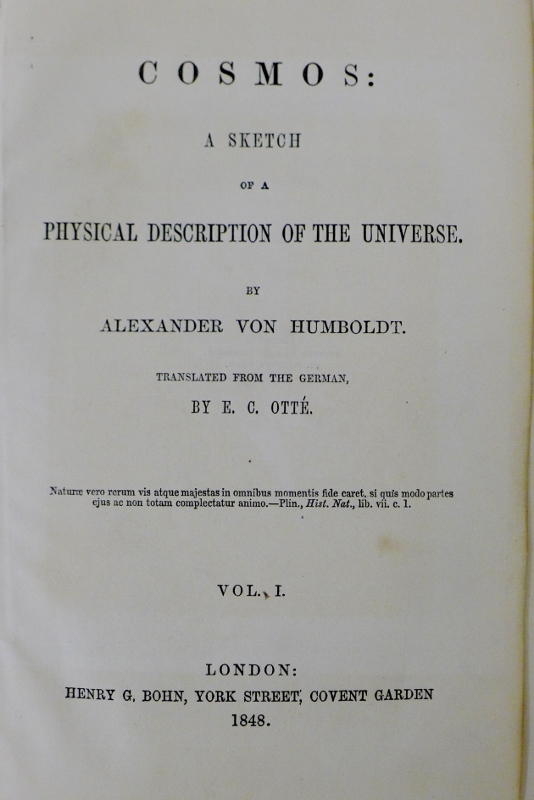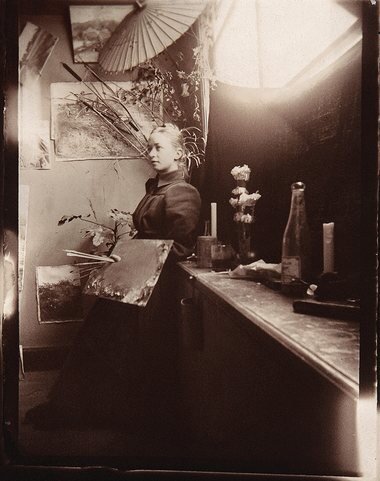Orchestra III from Connections 1983
Robert Frost - 'The Star-splitter'
"You know Orion always comes up sideways.
Throwing a leg up over our fence of mountains,
And rising on his hands, he looks in on me
Busy outdoors by lantern-light with something
I should have done by daylight, and indeed,
After the ground is frozen, I should have done
Before it froze, and a gust flings a handful
Of waste leaves at my smoky lantern chimney
To make fun of my way of doing things,
Or else fun of Orion's having caught me.
Has a man, I should like to ask, no rights
These forces are obliged to pay respect to?"
So Brad McLaughlin mingled reckless talk
Of heavenly stars with hugger-mugger farming,
Till having failed at hugger-mugger farming,
He burned his house down for the fire insurance
And spent the proceeds on a telescope
To satisfy a lifelong curiosity
About our place among the infinities.
"What do you want with one of those blame things?"
I asked him well beforehand. "Don't you get one!"
"Don't call it blamed; there isn't anything
More blameless in the sense of being less
A weapon in our human fight," he said.
"I'll have one if I sell my farm to buy it."
There where he moved the rocks to plow the ground
And plowed between the rocks he couldn't move,
Few farms changed hands; so rather than spend years
Trying to sell his farm and then not selling,
He burned his house down for the fire insurance
And bought the telescope with what it came to.
He had been heard to say by several:
"The best thing that we're put here for's to see;
The strongest thing that's given us to see with's
A telescope. Someone in every town
Seems to me owes it to the town to keep one.
In Littleton it may as well be me."
After such loose talk it was no surprise
When he did what he did and burned his house down.
Mean laughter went about the town that day
To let him know we weren't the least imposed on,
And he could wait—we'd see to him tomorrow.
But the first thing next morning we reflected
If one by one we counted people out
For the least sin, it wouldn't take us long
To get so we had no one left to live with.
For to be social is to be forgiving.
Our thief, the one who does our stealing from us,
We don't cut off from coming to church suppers,
But what we miss we go to him and ask for.
He promptly gives it back, that is if still
Uneaten, unworn out, or undisposed of.
It wouldn't do to be too hard on Brad
About his telescope. Beyond the age
Of being given one for Christmas gift,
He had to take the best way he knew how
To find himself in one. Well, all we said was
He took a strange thing to be roguish over.
Some sympathy was wasted on the house,
A good old-timer dating back along;
But a house isn't sentient; the house
Didn't feel anything. And if it did,
Why not regard it as a sacrifice,
And an old-fashioned sacrifice by fire,
Instead of a new-fashioned one at auction?
Out of a house and so out of a farm
At one stroke (of a match), Brad had to turn
To earn a living on the Concord railroad,
As under-ticket-agent at a station
Where his job, when he wasn't selling tickets,
Was setting out up track and down, not plants
As on a farm, but planets, evening stars
That varied in their hue from red to green.
He got a good glass for six hundred dollars.
His new job gave him leisure for stargazing.
Often he bid me come and have a look
Up the brass barrel, velvet black inside,
At a star quaking in the other end.
I recollect a night of broken clouds
And underfoot snow melted down to ice,
And melting further in the wind to mud.
Bradford and I had out the telescope.
We spread our two legs as it spread its three,
Pointed our thoughts the way we pointed it,
And standing at our leisure till the day broke,
Said some of the best things we ever said.
That telescope was christened the Star-Splitter,
Because it didn't do a thing but split
A star in two or three the way you split
A globule of quicksilver in your hand
With one stroke of your finger in the middle.
It's a star-splitter if there ever was one,
And ought to do some good if splitting stars
'Sa thing to be compared with splitting wood.
We've looked and looked, but after all where are we?
Do we know any better where we are,
And how it stands between the night tonight
And a man with a smoky lantern chimney?
How different from the way it ever stood?
Pattiann Rogers - The Origin of Order
Stellar dust has settled.
It is green underwater now in the leaves
Of the yellow crowfoot. Its vacancies are gathered together
Under pine litter as emerging flower of the pink arbutus.
It has gained the power to make itself again
In the bone-filled egg of osprey and teal.
One could say this toothpick grasshopper
Is a cloud of decayed nebula congealed and perching
On his female mating. The tortoise beetle,
Leaving the stripped veins of morning glory vines
Like licked bones, is a straw-colored swirl
Of clever gases.
At this moment there are dead stars seeing
Themselves as marsh and forest in the eyes
Of muskrat and shrew, disintegrated suns
Making songs all night long in the throats
Of crawfish frogs, in the rubbings and gratings
Of the red-legged locust. There are spirits of orbiting
Rock in the shells of pointed winkles
And apple snails, ghosts of extinct comets caught
In the leap of darting hare and bobcat, revolutions
Of rushing stone contained in the sound of these words.
The paths of the Pleiades and Coma clusters
Have been compelled to mathematics by the mind
Contemplating the nature of itself
In the motions of stars. The patterns
Of any starry summer night might be identical
To the summer heavens circling inside the skull.
I can feel time speeding now in all directions
Deeper and deeper into the black oblivion
Of the electrons directly behind my eyes.
Flesh of the sky, child of the sky, the mind
Has been obligated from the beginning
To create an ordered universe
As the only possible proof of its own inheritance.
——————————————-
Pattiann Rogers, “The Origin of Order” from Firekeeper: Selected Poems. Copyright © 2003 by Pattiann Rogers. Reprinted with the permission of Milkweed Editions, www.milkweed.org.
Source: Firekeeper: Selected Poems (Milkweed Editions, 2003)
The universe is overflowing with passion. For my own sake, I try with words to tap into that passion, that intense will-to-be, the tight hold against oblivion, the yes-power existing within all the manifestations of light.
Last word from this interview in 2008.
Pattiann Rogers - The Significance of Location
The cat has the chance to make the sunlight
Beautiful, to stop it and turn it immediately
Into black fur and motion, to take it
As shifting branch and brown feather
Into the back of the brain forever.
The cardinal has flown the sun in red
Through the oak forest to the lawn.
The finch has caught it in yellow
And taken it among the thorns. By the spider
It has been bound tightly and tied
In an eight-stringed knot.
The sun has been intercepted in its one
Basic state and changed to a million varieties
Of green stick and tassel. It has been broken
Into pieces by glass rings, by mist
Over the river. Its heat
Has been given the board fence for body,
The desert rock for fact. On winter hills
It has been laid down in white like a martyr.
This afternoon we could spread gold scarves
Clear across the field and say in truth,
"Sun you are silk."
Imagine the sun totally isolated,
Its brightness shot in continuous streaks straight out
Into the black, never arrested,
Never once being made light.
Someone should take note
Of how the earth has saved the sun from oblivion.
——————————-
Pattiann Rogers, "The Significance of Location" from Firekeeper. Copyright © 2005 by Pattiann Rogers. Reprinted by permission of Milkweed Editions.
Source: Firekeeper (Milkweed Editions, 2005)
Hilma af Klint
Alexander Humboldt on describing nature.
An extract from Volume II, Cosmos.
"Descriptions of nature, I would again observe, may be defined with sufficient sharpened scientific accuracy, without on that account being deprived of the vivyfying breath of imagination. The poetic element must emanate from the intuitive perception of the connection between the sensuous and the intellectual, and of the universality and reciprocal limitation and unity of all the vital forms of nature. The more elevated the subject, the more carefully should all external adornments of diction be avoided. The true effect of a picture of nature depends on its composition; every attempt at an artificial appeal from the author must therefore necessarily exert a disturbing influence. He who familiar with the great works of antiquity, and secure in the posession of the riches of his native language, knows how to represent with simplicity of individualising truth that which he has received from his own contemplation, will not fail in producing the impression he seeks to convey;
for in describing the boundlessness of nature, and not the limited circuit of his own mind, he is enabled to leave to others unfettered freedom of feeling."





